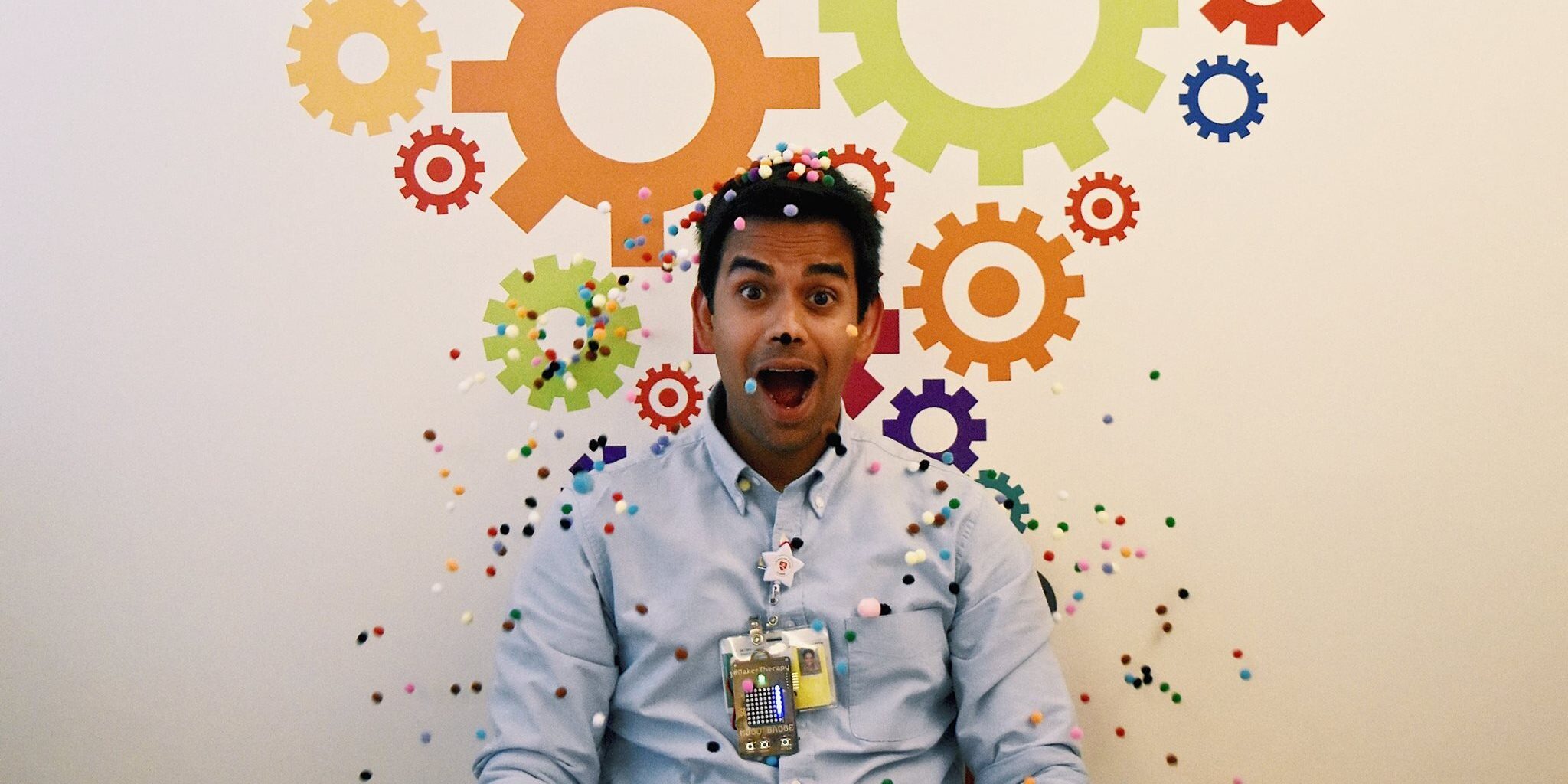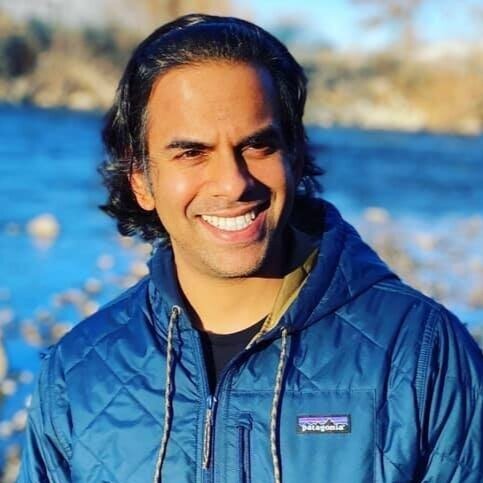
A Moment with Gokul Krishnan is part of our interview series featuring thought leaders in research and healthcare. Each interview includes 7 short and stimulating questions.
Gokul Krishnan is the Founder of Maker Therapy. This innovative pediatric patient experience offers hospitalized chronically and terminally ill youth creative and stimulating environments (Makerspaces) to provoke their sense of curiosity, encourage them to set up and pursue personal goals via invention, and inspire them to feel more agentive in taking charge of their healing process. Maker Therapy begins from a premise of hope. For more from Dr. Gokul, find him on Twitter.
1. Tell us something we don’t know. (Anything!)
In 2017, I took part in the Daytime Emmy Award-winning game show, Let’s Make A Deal, hosted by Wayne Brady. For the show, I wore a Cancer t-shirt in honor of Childhood Cancer Awareness month. I did go all the way to the “Big Deal.” I picked door number 3, which was a week-long vacation in beautiful Cancun, Mexico.
2. Which fiction book would you recommend to researchers and innovators in healthcare, and why?
Healthcare researchers and innovators need to have an empathetic, emotional, and compassionate mindset in working with stakeholders such as patients, families, and caregivers. One of my favorite books is The Rabbit Listened by Cori Doerrfeld, a profoundly moving book for all ages about empathy and kindness and how profound the simple act of listening can be. The book begins with Taylor constructing an impressive structure with his blocks. One day a flock of birds swoops by and destroys all his hard work. He is upset, and a variety of animals tell him what to do. The chicken tells Taylor to talk about his feelings. The bear says to yell! A hyena suggests Taylor laugh about it. A kangaroo suggests he throw everything away. The ostrich says he should pretend that it never happened. The snake encourages Taylor to feel better by knocking over someone else’s work. When the rabbit appears, he snuggles up to Taylor without saying a word. He listens to what Taylor says and doesn’t speak. The rabbit watches as Taylor laughs and keeps pretending nothing has happened. He listens as Taylor plans to throw it all away and ruin things for others. Finally, the rabbit listens to Taylor as he dreams of rebuilding something even bigger and better. Through it all the rabbit never left…he listened. Even though it’s a children’s book, I strongly recommend researchers and innovators in healthcare to read this book. I love the message it conveys — we can all be someone’s “rabbit.”
3. What are you working on right now that you’re excited about?
I’m currently working on an exciting participatory design project that focuses on designing and installing the nation’s first equitable and inclusive patient-centric Makerspace environments for terminally ill children and their families at George Mark Children’s House (GMCH). GMCH, located in San Leandro, California, focuses on quality of life and continuity of care for children with illnesses that modern healthcare cannot yet cure or for those who have chronic medical conditions. When you think of Makerspaces, you immediately think of schools, libraries, museums, and science centers. The last place you would expect to find a Makerspace is a pediatric palliative care facility. I couldn’t be more grateful to work with the facility.
4. Who’s doing something that you admire in healthcare today, and why is it so cool?
I have the wonderful opportunity to meet so many resilient patients and families at pediatric care settings who inspire me daily to be the best I can be. To them, I owe an immense debt of gratitude for allowing me to enter their lives and sharing their stories, struggles, and triumphs with me. As one patient told me, “I want to be defined as more than just a sick kid in the hospital. I am bright, imaginative, and innovative.” The privilege of working alongside young patients over the past decade has allowed me to see these patients not as merely “sick kids” in the hospital but rather as vital, inventive kids who have the potential to design, create and live fuller, healthier lives.
5. What’s the biggest barrier to getting things done in your line of work?
There is a sheer lack of equity in pediatric settings in how patients can control their mental and physical health. When provided with the right kind of resources, patients can be empowered to take charge of their holistic health. The biggest barrier I face is changing the fixed mindset of hospitals to a growth mindset; inspiring patients to feel more agentive in taking charge of their healing process.
6. Imagine you win an award for impacting healthcare. What did you do?
I would create a worldwide social media platform that would allow teen patients, while hospitalized, to connect with each other to share personally meaningful ideas and collaborate on solutions to help improve their medical experience while hospitalized.
7. What advice would you give innovators in healthcare?
In a healthcare system that is pivoting toward patient-centered care, patients need to be viewed as experts of their own experiences. Healthcare innovators need to give patients access to tools and technologies to design and innovate, improve their medical experience based on their personal circumstances and share their creativity with the healthcare community. Co-design among healthcare professionals and patients – and broadening access to the use of technologies among patients, particularly young kids who are in the prime of learning and development – will lead to the most transformative solutions.
More about Gokul Krishnan:

Gokul launched Maker Therapy because he believes that young people need rich learning opportunities and creative outlets regardless of diagnosis. There is often a lot of despair that accompanies the diagnosis of a life-threatening illness or hospitalization. Especially for children in this situation, it’s essential to offer outlets that encourage growth, playfulness, and a sense of achievement. Maker Therapy supports young patients by focusing not only on the present but also on the future — providing opportunities for these young children and teens to explore and express who they are, who they dream of becoming, and the impact they can make right now. Maker Therapy begins from a premise of hope.
Gokul has a Bachelors in Manufacturing Engineering from India, a Master’s in Mechanical Engineering from the University of California, Riverside, and a Ph.D. in Learning Sciences from Vanderbilt University. In 2015 Gokul was recognized by the White House for pioneering Maker Therapy and designing the world’s first Makerspace environment in a pediatric care setting for Cystic Fibrosis patients at Vanderbilt Children’s Hospital. His Maker Therapy initiative has been featured in multiple media outlets such as CBS Evening News, NPR All Things Considered, Fast Company, Popular Mechanics and NASDAQ. Gokul is on a mission to create a more hopeful world for all children living with an illness.